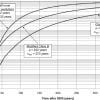Principles of soil mechanics
Online course |
|
50 hours / 6 weeks |
|
|
Dates: 24th of June to 5th of August |
| Standard | Unemployed Or Student |
| $292 | $216 |
Introduction
The purpose of this course is to provide the learner with easy-to-understand introductions to the subjects of geotechnical engineering and soil mechanics. The level of the subjects covered are first year university level and will be easily followed by anyone studying, practicing, or simply interested in, civil engineering. No prior knowledge of geotechnical engineering is required.
Following this course the learner will be equipped to take further study if they wish, to develop deeper knowledge and understanding of the various methods and procedures used in the design and construction of geotechnical structures such as foundations, retaining walls and cuttings and embankments.
The course commences with an introduction to geotechnical engineering, illustrated by examples of the range of projects on which geotechnical engineers may be involved. An explanation of the geological processes that form soils follows, before we start to look properly at the subjects that form the basis of the subject of soil mechanics. Those subjects are well explained and complemented by many worked examples so that the learner can readily understand the material. Completion of the course will enable the learner to apply their knowledge to their needs, whether they are a student or a practitioner.
On line support is available throughout the duration of the course.
Limited places.
- Introduction to geotechnical engineering
- – Geotechnical engineering projects
- – Geotechnical design work:
- – Stratigraphy
- – Classification
- – Stiffness
- – Strength
- – Groundwater
- Origin of soils
- – Formation of soils: weathering, erosion and deposition
- – Residual and transported soils
- – Structure and fabric of soils
- – Granular and cohesive soils
- – Mechanical behaviour of granular and cohesive soils
- – Water in soils
- Site investigation
- – Objectives
- – Desk study
- – Walkover survey
- – Ground investigation
- – Site exploration methods
- – Sampling of soils
- – Field testing
- – Laboratory testing
- – Geotechnical reports
- Classification of soils
- – Drying of soils
- – Determination of the water content
- – Classification of granular soils: the particle size distribution test
- – Effective size of a distribution, D10
- – Grading of a distribution
- – Uniformity coefficient, Cu
- – The consistency limits
- – Classification of cohesive soils: Index tests
- – Description of soils
- Properties of soils
- – Void ratio
- – Porosity
- – Degree of saturation
- – Particle density and specific gravity
- – Density and unit weight
- – Measurement of density
- – Soil physical relations
- Permeability and water flow in soils
- – Hydrological cycle
- – Subsurface water
- – Flow of water in soils:
- – Saturated flow
- – Hydraulic head
- – Seepage velocity
- Darcy’s Law of saturated flow
- Coefficient of permeability
- – Determination of permeability in the laboratory
- – Field determination of permeability
- – Flow nets
- – Quick condition and piping
- – Critical hydraulic gradient
- Total stress, pore water pressure and effective stress
- – Total stress
- – Multi-layered soils
- – Presence of water table
- – Pore water pressure
- – Effective stress
- – Stresses induced by applied loading
Professor Ian Smith
Professor Ian Smith is a freelance geotechnical and educational consultant with over 25 years experience teaching geotechnical engineering. Based in the UK, he is internationally recognised and has taught at universities across Europe and in China, Myanmar, Hong Kong and Qatar. He is the author of the leading textbook, Smith’s Elements of Soil Mechanics – now in its 9th Edition and adopted by almost all UK universities and by many across the world.He is praised for making his subject very easy to understand and has won several teaching awards based on his excellent student feedback. More details can be found at his website and LinkedIn profile.
The course is delivered online through our easy-to-use Virtual Campus platform. For this course, a variety of content is provided including:
– eLearning materials
– Videos
– Interactive multimedia content
– Live webinar classes
– Texts and technical articles
– Case studies
– Assignments and evaluation exercises
Students can download the materials and work through the course at their own pace.
We regularly update this course to ensure the latest news and state-of-the-art developments are covered, and your knowledge of the subject is current.
Live webinars form part of our course delivery. These allow students and tutors to go through the course materials, exchange ideas and knowledge, and solve problems together in a virtual classroom setting. Students can also make use of the platform’s forum, a meeting point to interact with tutors and other students.
The tutoring system is managed by email. Students can email the tutor with any questions about the course and the tutor will be happy to help.
This course is aimed at:(i) college and university students who wish to learn or refresh their knowledge of soil mechanics alongside their current studies, and (ii) practitioners (technicians and engineers alike) who need to refresh or update their knowledge of soil mechanics. By studying the course, the learner will fully understand and appreciate the fundamental principles involved as well as test and measurement procedures used in the soils laboratory and in the field: not only how to do the test, but the reasons why we need the tests carried out.
The course is also suitable for practicing engineers whose knowledge of the principles of soil mechanics is a bit rusty and in need of refreshing.
The course is delivered in such an easy-to-understand way that all participants will be able to follow all the topics covered and significantly improve their understanding of the principles and examples of soil mechanics.
Once a student finishes the course and successfully completes the assignments and evaluation tests, they are sent an accreditation certificate. The certificate is issued by Ingeoexpert to verify that the student has passed the course. It is a digital certificate that is unique and tamper-proof – it is protected by Blockchain technology. This means it is possible for anyone to check that it is an authentic, original document.
You will be able to download the certificate in an electronic format from the Virtual Campus platform. The certificate can be forwarded by email, shared on social networks, and embedded on websites. To see an example, click here.
The course is appropriate for anyone studying or working at any level in the civil engineering sector.
An understanding of the mechanical behaviour of engineering soils is important for anyone working in civil engineering. Whether you are a student, a designer, a contractor, an academic, a researcher or working in civil engineering maintenance, knowing the way that different soils will behave under loading or as a result of water movement is important. This course will teach you all of that and more.
Geotechnical engineering is arguably the most important discipline in civil engineering, since all structures are built either onto or into the ground. Thus, knowledge of soil mechanics is a fundamental requirement for all people wishing to succeed in civil engineering. The course has been structured and developed to enable all participants to acquire that knowledge.
Introduction
The purpose of this course is to provide the learner with easy-to-understand introductions to the subjects of geotechnical engineering and soil mechanics. The level of the subjects covered are first year university level and will be easily followed by anyone studying, practicing, or simply interested in, civil engineering. No prior knowledge of geotechnical engineering is required.
Following this course the learner will be equipped to take further study if they wish, to develop deeper knowledge and understanding of the various methods and procedures used in the design and construction of geotechnical structures such as foundations, retaining walls and cuttings and embankments.
The course commences with an introduction to geotechnical engineering, illustrated by examples of the range of projects on which geotechnical engineers may be involved. An explanation of the geological processes that form soils follows, before we start to look properly at the subjects that form the basis of the subject of soil mechanics. Those subjects are well explained and complemented by many worked examples so that the learner can readily understand the material. Completion of the course will enable the learner to apply their knowledge to their needs, whether they are a student or a practitioner.
On line support is available throughout the duration of the course.
Limited places.
- Introduction to geotechnical engineering
- – Geotechnical engineering projects
- – Geotechnical design work:
- – Stratigraphy
- – Classification
- – Stiffness
- – Strength
- – Groundwater
- Origin of soils
- – Formation of soils: weathering, erosion and deposition
- – Residual and transported soils
- – Structure and fabric of soils
- – Granular and cohesive soils
- – Mechanical behaviour of granular and cohesive soils
- – Water in soils
- Site investigation
- – Objectives
- – Desk study
- – Walkover survey
- – Ground investigation
- – Site exploration methods
- – Sampling of soils
- – Field testing
- – Laboratory testing
- – Geotechnical reports
- Classification of soils
- – Drying of soils
- – Determination of the water content
- – Classification of granular soils: the particle size distribution test
- – Effective size of a distribution, D10
- – Grading of a distribution
- – Uniformity coefficient, Cu
- – The consistency limits
- – Classification of cohesive soils: Index tests
- – Description of soils
- Properties of soils
- – Void ratio
- – Porosity
- – Degree of saturation
- – Particle density and specific gravity
- – Density and unit weight
- – Measurement of density
- – Soil physical relations
- Permeability and water flow in soils
- – Hydrological cycle
- – Subsurface water
- – Flow of water in soils:
- – Saturated flow
- – Hydraulic head
- – Seepage velocity
- Darcy’s Law of saturated flow
- Coefficient of permeability
- – Determination of permeability in the laboratory
- – Field determination of permeability
- – Flow nets
- – Quick condition and piping
- – Critical hydraulic gradient
- Total stress, pore water pressure and effective stress
- – Total stress
- – Multi-layered soils
- – Presence of water table
- – Pore water pressure
- – Effective stress
- – Stresses induced by applied loading
Professor Ian Smith
Professor Ian Smith is a freelance geotechnical and educational consultant with over 25 years experience teaching geotechnical engineering. Based in the UK, he is internationally recognised and has taught at universities across Europe and in China, Myanmar, Hong Kong and Qatar. He is the author of the leading textbook, Smith’s Elements of Soil Mechanics – now in its 9th Edition and adopted by almost all UK universities and by many across the world.He is praised for making his subject very easy to understand and has won several teaching awards based on his excellent student feedback. More details can be found at his website and LinkedIn profile.
The course is delivered online through our easy-to-use Virtual Campus platform. For this course, a variety of content is provided including:
– eLearning materials
– Videos
– Interactive multimedia content
– Live webinar classes
– Texts and technical articles
– Case studies
– Assignments and evaluation exercises
Students can download the materials and work through the course at their own pace.
We regularly update this course to ensure the latest news and state-of-the-art developments are covered, and your knowledge of the subject is current.
Live webinars form part of our course delivery. These allow students and tutors to go through the course materials, exchange ideas and knowledge, and solve problems together in a virtual classroom setting. Students can also make use of the platform’s forum, a meeting point to interact with tutors and other students.
The tutoring system is managed by email. Students can email the tutor with any questions about the course and the tutor will be happy to help.
This course is aimed at:(i) college and university students who wish to learn or refresh their knowledge of soil mechanics alongside their current studies, and (ii) practitioners (technicians and engineers alike) who need to refresh or update their knowledge of soil mechanics. By studying the course, the learner will fully understand and appreciate the fundamental principles involved as well as test and measurement procedures used in the soils laboratory and in the field: not only how to do the test, but the reasons why we need the tests carried out.
The course is also suitable for practicing engineers whose knowledge of the principles of soil mechanics is a bit rusty and in need of refreshing.
The course is delivered in such an easy-to-understand way that all participants will be able to follow all the topics covered and significantly improve their understanding of the principles and examples of soil mechanics.
Once a student finishes the course and successfully completes the assignments and evaluation tests, they are sent an accreditation certificate. The certificate is issued by Ingeoexpert to verify that the student has passed the course. It is a digital certificate that is unique and tamper-proof – it is protected by Blockchain technology. This means it is possible for anyone to check that it is an authentic, original document.
You will be able to download the certificate in an electronic format from the Virtual Campus platform. The certificate can be forwarded by email, shared on social networks, and embedded on websites. To see an example, click here.
The course is appropriate for anyone studying or working at any level in the civil engineering sector.
An understanding of the mechanical behaviour of engineering soils is important for anyone working in civil engineering. Whether you are a student, a designer, a contractor, an academic, a researcher or working in civil engineering maintenance, knowing the way that different soils will behave under loading or as a result of water movement is important. This course will teach you all of that and more.
Geotechnical engineering is arguably the most important discipline in civil engineering, since all structures are built either onto or into the ground. Thus, knowledge of soil mechanics is a fundamental requirement for all people wishing to succeed in civil engineering. The course has been structured and developed to enable all participants to acquire that knowledge.
7 reviews for Principles of soil mechanics
More info
Finish this course and get a certificate based on Blockchain
Principles of soil mechanics

Blockchain technology makes the certificate incorruptible, enabling companies to verifiy its autenticity.
Principles of soil mechanics
| $292 | $216 | |
| Get more information |




Randall Benevage –
Outstanding! Professor Smith does a great job presenting the material in a format that is easy to grasp and responds to your questions promptly. I’m looking forward to taking Professor Smith’s Advanced Soil Mechanics class. My money was well spent on this class.
Silvia Ferrer –
This course is everything I was looking for, thank you Ian for such a comprehensive and well structured course. I can’t wait to explore other courses!
Mark Bibby –
The course was really easy to follow along. You just need to carve out the amount of time each week to watch the videos and follow along with the exercises. Great platform and interactive if you want it to be.
PHINDULO MUGOVHANI –
Prof Ian Smith is a great lecturer, he explains very well and makes everything very simple to undertand. I also like how he structured the course content.
Davide Boni –
I loved this course and the IngeoExpert platform is really intuitive and well organised.
Anush Ghazaryan –
I am delighted by the way professor Ian Smith teaches. Сeemingly difficult concepts, but it turns out everything is much simpler in reality. I love it so much. Thanks a lot.
José de Oliveira Mello Junior –
As a Brazilian geotechnical engineer, it was a good opportunity for refreshing my soil mechanic knowledge in English.